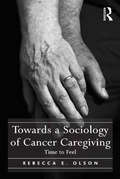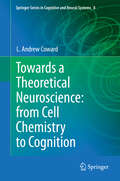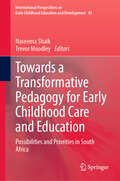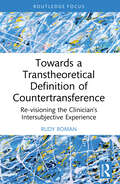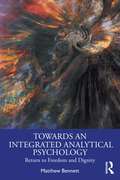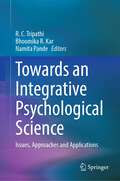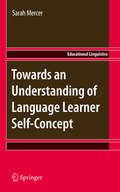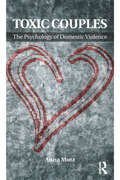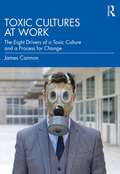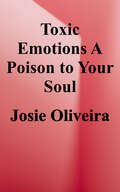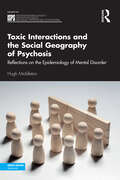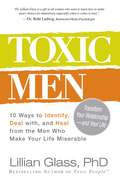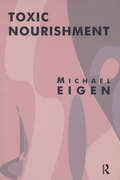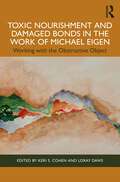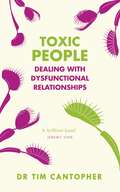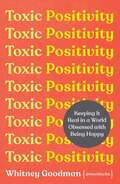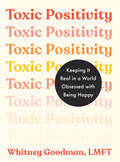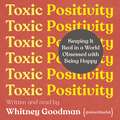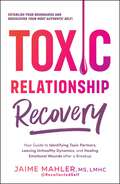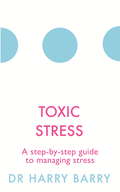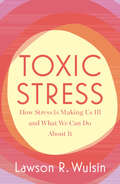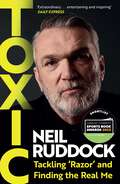- Table View
- List View
Towards a Sociology of Cancer Caregiving: Time to Feel
by Rebecca E. OlsonOnce a synonym for death, cancer is now a prognosis of multiple probabilities and produces a world of uncertainty for carers. Drawing on rich, in-depth interview data and employing interactionist theories, Towards a Sociology of Cancer Caregiving explores carers' lived experiences, paying close attention to the ways in which spouse carers manage the ambiguity that pervades their orientations to the future, their responsibilities and their emotions. A detailed exploration of the temporal and emotional journeys of spouse carers of cancer patients, this volume raises and responds to new questions about how to conceptualise informal caregiving, offering a fresh theorisation of the uncertainty that now characterises cancer. As such, it will appeal to scholars of the sociologies of emotion, time and identity, and all those interested in the question of how to support informal carers.
Towards a Theoretical Neuroscience: from Cell Chemistry to Cognition
by L. Andrew CowardThe book explains how to understand cognition in terms of brain anatomy, physiology and chemistry, using an approach adapted from techniques for understanding complex electronic systems. These techniques create hierarchies of information process based descriptions on different levels of detail, where higher levels contain less information and can therefore describe complete cognitive phenomena, but are more approximate. The nature of the approximations are well understood, and more approximate higher level descriptions can therefore be mapped to more precise detailed descriptions of any part of a phenomenon as required. Cognitive phenomena, the anatomy and connectivity of major brain structures, neuron physiology, and cellular chemistry are reviewed. Various cognitive tasks are described in terms of information processes performed by different major anatomical structures. These higher level descriptions are selectively mapped to more detailed physiological and chemical levels.
Towards a Transformative Pedagogy for Early Childhood Care and Education: Possibilities and Priorities in South Africa (International Perspectives on Early Childhood Education and Development #43)
by Naseema Shaik Trevor MoodleyThis book addresses the priorities and possibilities towards developing transformative pedagogies in post-apartheid South Africa. To this end, the book has assembled a group of researchers who interrogated and engaged with a variety of dimensions that warrant pedagogical change in early childhood in South Africa. The book focuses on young children, practitioners, and leaders with intersecting discussions about envisaged systemic changes to promote transformative pedagogies. The collection highlights the importance of beliefs, ways of knowing, and ways of being as framings that impact on pedagogical approaches. The book discusses the challenges that interplay between priorities and possibilities that practitioners face in a diverse and multi-cultural society like South Africa. The work uses a variety of examples to show priorities. One example is about how practitioners have limited knowledge about how music, as a culturally responsive tool, can be used to transform pedagogy in Early Childhood Care and Education. The book opens up dimensions as priorities that lead to thinking about possibilities that recast adults and young children as transformative agents in a dimension for transformative pedagogies.
Towards a Transtheoretical Definition of Countertransference: Re-visioning the Clinician's Intersubjective Experience (Explorations in Mental Health)
by Rudy RomanThis book explores the analyst’s countertransference experience in clinical settings from a number of theoretical perspectives in order to develop a transtheoretical definition of countertransference. Stemming from an examination of the definition of countertransference itself, the author utilizes a philosophical hermeneutic approach to ask how pathological countertransference develops, how analysts separate themselves from the patient’s experience, and what analysts should do to prevent their countertransference response from interfering with treatment. Through the unique hermeneutic methodology, philosophical themes within selected writings are explored as a way of gaining a deeper meaning and understanding of countertransference. By re-interpreting these selected writings in a new light, the book develops a transtheoretical definition and approach to countertransference. As such, the author offers a timely reassessment of the meaning and understanding of countertransference as it has evolved over the past century, going from being considered an obstacle to treatment brought on by the analyst’s unconscious conflicts to being understood as a way of communicating and understanding the patient’s unconscious material. It also provides a unique pathway through various depth psychological, therapeutic, and theoretical approaches to countertransference, foregrounding the significance and therapeutic value of the concept and seeking a new transtheoretical definition. This volume will appeal to scholars and researchers of psychology and mental health.
Towards an Integrated Analytical Psychology: Return to Freedom and Dignity
by Matthew BennettTowards an Integrated Analytical Psychology presents a comprehensive review of some of the salient philosophical, cultural, social, and clinical ingredients that have gone into contemporary visions of human personality development and psychotherapy and proposes a “unified field” theory of mental representation which puts psychoanalytic, analytic, and cognitive-behavioral perspectives in a mutually integrative framework. The model proposed by Matthew Bennett, called Integrative Analytical Psychology, presents two major dimensions of personality development, and is integrative of Jungian and psychoanalytic perspectives, but places the Jungian concept of archetype as its core organizing principle. The six mental representations included within this model are: Archetype, Symbol, Object, Complex, Schema, and Self. This book strongly accents clinical application, and more broadly considers the applied clinical implications of these mental representations to psychotherapy and clinical practice. Towards an Integrated Analytical Psychology offers a novel model of understanding personality and will be of direct and immediate use for psychotherapists and students of psychotherapy, especially those from the psychoanalytic and analytic/Jungian tradition. It would also be of interest to social workers, marriage, and family therapists and psychiatrists.
Towards an Integrative Psychological Science: Issues, Approaches and Applications
by R. C. Tripathi Bhoomika R. Kar Namita PandeThis edited volume examines the new ways of conceptualizing Psychology as an integrative science to understand human problems at the individual, group, societal, and national levels. It focuses on the need for Psychology to move away from its present reductionist perspective to an integrative psychological science perspective. The volume is organized into three main sections: The first discusses the convergence of qualitative and quantitative methodological approaches in Psychology. The second part highlights the importance of social and personal wellness. The third focuses on studying human behaviour in the context of cultural variations and the impact of cultural context on psychological processes. The book includes contributions from leading scholars in psychology in India whose reference to practical, social and political issues of contemporary interest makes the volume stand out. This book serves as a resource to initiate the dialogue about the need, issues, levels, and integration methods in Psychology, which can be scientifically tested and theoretically explained. The comprehensive and authoritative volume is of interest to researchers and scholars in cognitive psychology, clinical psychology, organizational psychology, social psychology and cross-cultural psychology.
Towards an Understanding of Language Learner Self-Concept
by Sarah MercerThis book contributes to our growing understanding of the nature and development of language learner self-concept. It assesses the relevant literature in the disciplines of psychology and applied linguistics and describes in-depth, qualitative research examining the self-concepts of tertiary-level EFL learners. Although researchers in applied linguistics and SLA have recognized the importance of self-constructs, there remains little empirical work in the context of foreign language learning that focuses exclusively and at length on this central psychological construct. The content of this monograph draws on interdisciplinary sources, with input from psychology and applied linguistics. It will appeal to students and researchers interested in language-learner psychology as well as self-related constructs in general. The text provides insights into how learners view themselves, and how these self-beliefs can develop and affect the progress of an individual's language learning.
Toxic Couples: The Psychology Of Domestic Violence
by Anna MotzDomestic violence is a major public health concern, affecting millions worldwide. It is underreported, often devastating and sometimes ends in murder. In Toxic Couples: The Psychology of Domestic Violence, Anna Motz integrates psychological and criminological data with clinical illustrations and discussion of current high-profile cases. She examines the complex manifestations and multiple causes of intimate partner violence. Motz disentangles the roles played by those involved and examines the addictive nature of these damaging partnerships. The book describes various forms of abuse, including physical, sexual and emotional, and analyses how intimate partner violence can escalate to murder. She explores important factors including: the role of addiction; homelessness and vulnerability; the intergenerational transmission of abuse; sadomasochistic relationships; honour-based violence. The book emphasizes the significance of female- as well as male-perpetrated violence and outlines the powerful impact on the children of abusive parents, extending the clinical awareness of professionals working with those affected. Toxic Couples: The Psychology of Domestic Violence is ideal for clinicians working with the victims and perpetrators of intimate partner violence, for students of psychology, gender studies and social care courses and for anyone interested in the psychological forces behind violence in relationships.]
Toxic Cultures at Work: The Eight Drivers of a Toxic Culture and a Process for Change
by James CannonAround the world and across industries, toxic workplaces are in the news. Taking a holistic approach, this book gives a succinct summary of how toxic cultures develop and shows how they can be remedied with practical takeaways for organisations. Existing books on toxic culture either skim the surface of the latest scandal or take a theoretical approach of limited use to practitioners trying to improve their organisations. Now, organisational development expert James Cannon presents an all-in-one resource based on organisational and individual psychology research that offers actionable suggestions for required change. Cannon provides a framework to understand the complexities of a toxic culture, identifying eight drivers: power, leadership personalities, values, organisation design, formal and informal systems, relations with the external environment and individual systems of motivation and reward. The book also offers a comprehensive toolkit with questionnaires and checklists to manage and achieve cultural change. Professionals and students in organisational psychology, business, and change management, as well as those with an interest in the political and social issues raised by toxic cultures, will appreciate this guide on how to tackle a problem that is much discussed but seldom solved.
Toxic Emotions: A Poison to Your Soul
by Josie OliveiraToxic emotions damage our physical and emotional health and generate vicious thinking which affects our communication, behavior, relationships and decisions. They also influence our self-image and self-esteem. Emotions and feelings are interconnected, since we are generating a feeling that can impact us in a positive or negative way, respecting the moment we allow an emotion to enter through our thoughts. <p><p>In this book the author explains how we can be freed from toxic emotions, through valuable techniques and relevant tips, in order to live an abundantly joyful and purposeful life.
Toxic Interactions and the Social Geography of Psychosis: Reflections on the Epidemiology of Mental Disorder (The International Society for Psychological and Social Approaches to Psychosis Book Series)
by Hugh MiddletonToxic Interactions is a review of quantitative research revealing how urban living, trauma, ethnicity, stress and familial influence the risk of troubling psychotic experiences. Each of these is reviewed in search of their social implications, and a constructivist approach identifies their common threads. The contributions of newer psychotherapeutic approaches such as Open Dialogue and Recovery programmes are considered, and a consistent interpretation emerges; that is not the observable features of disturbed mental state that deserve key attention, but how these are generally understood by others, and in particular the 'client's' close associates. Toxic Interactions and the Social Geography of Psychosis will be welcomed by all who find conventional approaches to mental health difficulties unsatisfactory, whether that is as a practitioner frustrated by the counter-productive expectations of their institutional setting, an academic exploring different perspectives a 'service user' disappointed by not experiencing the care they feel is needed, or as third party perplexed by the contradictions of contemporary psychiatry.
Toxic Men
by Lillian GlassKnow Thine Toxic Man.Toxic men come in all shapes, sizes, and dysfunctions. The trick is to know one when you see one--and how to deal with him. In this book, bestselling author and therapist Dr.Lillian Glass shows you how to identify toxic men, and gives you the specific tools you need to avoid them when you can--and handle them effectively when you cannot. This groundbreaking look at toxic men and the women who are involved with them offers a three-part approach:Part One: 10 types of toxic men, from the "Sneaky Passive Aggressive Silent But Deadly Erupting Volcano" to the "Instigating Backstabbing Meddler"Part Two: 10 ways to deal with toxic men, including the "Blow Out, Let It Go Technique" and the "Give Them Hell and Yell Technique"Part Three: How to heal after a toxic relationship, from getting professional help to making amendsWith Dr. Glass's profound yet practical advice, you can take charge of your life--and rid your relationships of toxic men once and for all. Whether you're struggling to date a decent guy or are already trapped in a toxic relationship, Dr. Glass gives you the answers you need to leave dysfunction behind--and find a man capable of a health, loving relationship.
Toxic Men: 10 Ways to Identify, Deal with, and Heal from the Men Who Make Your Life Miserable
by Lillian GlassKnow Thine Toxic Man.Toxic men come in all shapes, sizes, and dysfunctions. The trick is to know one when you see one--and how to deal with him. In this book, bestselling author and therapist Dr.Lillian Glass shows you how to identify toxic men, and gives you the specific tools you need to avoid them when you can--and handle them effectively when you cannot. This groundbreaking look at toxic men and the women who are involved with them offers a three-part approach:Part One: 10 types of toxic men, from the "Sneaky Passive Aggressive Silent But Deadly Erupting Volcano" to the "Instigating Backstabbing Meddler"Part Two: 10 ways to deal with toxic men, including the "Blow Out, Let It Go Technique" and the "Give Them Hell and Yell Technique"Part Three: How to heal after a toxic relationship, from getting professional help to making amendsWith Dr. Glass's profound yet practical advice, you can take charge of your life--and rid your relationships of toxic men once and for all. Whether you're struggling to date a decent guy or are already trapped in a toxic relationship, Dr. Glass gives you the answers you need to leave dysfunction behind--and find a man capable of a health, loving relationship.
Toxic Nourishment
by Michael EigenThis book portrays a range of individuals who seek nourishment from poisons or, to variable extents, are poisoned by the nourishment they seek. It describes the analyses leading to de-programming the patients from their toxins and intoxicators.
Toxic Nourishment and Damaged Bonds in the Work of Michael Eigen: Working with the Obstructive Object
by Loray Daws Keri S. CohenToxic Nourishment and Damaged Bonds in the Work of Michael Eigen examines Eigen’s rich phenomenological work on the Obstructive Object.The contributors to this collection explore the core theme with reference to key Eigen works, including The Psychotic Core, Psychic Deadness, Toxic Nourishment, and Damaged Bonds. This volume seeks to elaborate on the Obstructive Object through essays and poems that include poignant clinical examples, the impact of exceptionally traumatized patients on their analysts, literature comparisons, and the more "mystical aspect" of Eigen’s influence on working with the obstructive object. Essays draw from Virginia Woolf, Elena Ferrante, Wilfred Bion, D.W. Winnicott, Andrè Greene, Christopher Bollas, and Adam Phillips, among many others, in exploring injury-rage, unwanted patients, psychoanalytic faith, toxic nourishment, and damaged bonds.Toxic Nourishment and Damaged Bonds in the Work of Michael Eigen will greatly interest psychoanalysts, psychotherapists, and those interested in psychoanalytic and spiritual psychology.
Toxic People: Dealing With Dysfunctional Relationships
by Tim Cantopher'A brilliant book about how we identify the often-charming people who only spread misery.' Jeremy Vine, BBC Radio 2BMA MEDICAL AWARDS 2020: HIGHLY COMMENDEDSome people are so stressful, they can actually make us ill. Gameplayers, bullies, users and abusers - all pose a risk to our health and welfare if we don't take action. This book presents the tools we need to deal with the toxic people in our lives who drain our energy. It explains how to make healthy relationship choices, set proper boundaries and recognize the red flags that should alert us to avoid certain people. Whether you are struggling with a narcissistic partner, or dealing with a bullying boss or a sociopathic colleague, there is practical advice that will help you not only to protect your mental wellbeing but also to thrive. You will understand the nature of the toxic workplace - how to avoid it and if necessary survive within it. If you're surrounded by the takers of this world, read this book and gain the freedom to make your own choices and live your own life.
Toxic People: Dealing With Dysfunctional Relationships
by Tim Cantopher'A brilliant book about how we identify the often-charming people who only spread misery.' Jeremy Vine, BBC Radio 2BMA MEDICAL AWARDS 2020: HIGHLY COMMENDEDSome people are so stressful, they can actually make us ill. Gameplayers, bullies, users and abusers - all pose a risk to our health and welfare if we don't take action. This book presents the tools we need to deal with the toxic people in our lives who drain our energy. It explains how to make healthy relationship choices, set proper boundaries and recognize the red flags that should alert us to avoid certain people. Whether you are struggling with a narcissistic partner, or dealing with a bullying boss or a sociopathic colleague, there is practical advice that will help you not only to protect your mental wellbeing but also to thrive. You will understand the nature of the toxic workplace - how to avoid it and if necessary survive within it. If you're surrounded by the takers of this world, read this book and gain the freedom to make your own choices and live your own life.
Toxic Positivity: Keeping It Real in a World Obsessed with Being Happy
by Whitney Goodman'I really felt like I came away with a new perspective. This book will make you want to bin your gratitude journal in the best possible way' Stylist 'This trailblazing book will help you transform your perspective about positivity' Nedra Glover Tawwab, bestselling author of Set Boundaries, Find Peace'Finally a book that explains exactly why 'positivity at all costs' backfires, and teaches us how to process our pain instead of pretending it doesn't exist.' Caroline Dooner, author of The F*uck It Diet'The counterbalance to a world that preaches 'look on the bright side' whenever life gets tough' Elizabeth Earnshaw, relationship expert and author of I Want This To WorkEvery day, we're bombarded with pressure to be positive. From 'good vibes only' and 'life is good' memes, to endless advice, to 'look on the bright side,' we're constantly told that the key to happiness is silencing negativity wherever it crops up, in ourselves and in others. Even when faced with illness, loss, breakups, and other challenges, there's little space for talking about our real feelings-and processing them so that we can feel better and move forward.But if all this positivity is the answer, why are so many of us anxious, depressed, and burned out?In this refreshingly honest guide, sought-after therapist Whitney Goodman shares the latest research along with everyday examples and client stories that reveal how damaging toxic positivity is to ourselves and our relationships, and presents simple ways to experience and work through difficult emotions. The result is more authenticity, connection, and growth - and ultimately, a path to showing up as you truly are.
Toxic Positivity: Keeping It Real in a World Obsessed with Being Happy
by Whitney GoodmanA powerful guide to owning our emotions—even the difficult ones—in order to show up authentically in the world, from the popular therapist behind the Instagram account @sitwithwhit.Every day, we&’re bombarded with pressure to be positive. From &“good vibes only&” and &“life is good&” memes, to endless advice, to &“look on the bright side,&” we&’re constantly told that the key to happiness is silencing negativity wherever it crops up, in ourselves and in others. Even when faced with illness, loss, breakups, and other challenges, there&’s little space for talking about our real feelings—and processing them so that we can feel better and move forward. But if all this positivity is the answer, why are so many of us anxious, depressed, and burned out? In this refreshingly honest guide, sought-after therapist Whitney Goodman shares the latest research along with everyday examples and client stories that reveal how damaging toxic positivity is to ourselves and our relationships, and presents simple ways to experience and work through difficult emotions. The result is more authenticity, connection, and growth—and ultimately, a path to showing up as you truly are.
Toxic Positivity: Keeping It Real in a World Obsessed with Being Happy
by Whitney Goodman'I really felt like I came away with a new perspective. This book will make you want to bin your gratitude journal in the best possible way' Stylist 'This trailblazing book will help you transform your perspective about positivity' Nedra Glover Tawwab, bestselling author of Set Boundaries, Find Peace'Finally a book that explains exactly why 'positivity at all costs' backfires, and teaches us how to process our pain instead of pretending it doesn't exist.' Caroline Dooner, author of The F*uck It Diet'The counterbalance to a world that preaches 'look on the bright side' whenever life gets tough' Elizabeth Earnshaw, relationship expert and author of I Want This To WorkEvery day, we're bombarded with pressure to be positive. From 'good vibes only' and 'life is good' memes, to endless advice, to 'look on the bright side,' we're constantly told that the key to happiness is silencing negativity wherever it crops up, in ourselves and in others. Even when faced with illness, loss, breakups, and other challenges, there's little space for talking about our real feelings-and processing them so that we can feel better and move forward.But if all this positivity is the answer, why are so many of us anxious, depressed, and burned out?In this refreshingly honest guide, sought-after therapist Whitney Goodman shares the latest research along with everyday examples and client stories that reveal how damaging toxic positivity is to ourselves and our relationships, and presents simple ways to experience and work through difficult emotions. The result is more authenticity, connection, and growth - and ultimately, a path to showing up as you truly are.
Toxic Relationship Recovery: Your Guide to Identifying Toxic Partners, Leaving Unhealthy Dynamics, and Healing Emotional Wounds after a Breakup
by Jaime MahlerLet go of your toxic partner, heal your emotional wounds, and set healthy boundaries for future relationships with this step-by-step guide to overcoming toxic relationships.From red flags to crossed boundaries, to lies and gaslighting, you&’ve recognized that you were or currently are in a toxic relationship. But now what? It&’s time to fully let the relationship go and begin to heal. With Toxic Relationships, you&’ll address the ways that you were wronged during your relationship. You&’ll learn strategies for how to trust other people and yourself again after being gaslit, find the warning signs of toxicity and narcissism in others, and reframe negative, harmful thoughts to a positive outlook on life. As you work to let go of the toxic relationship that ate away at your happiness, you&’ll learn how to carve out space for you to be happy on your own and to love yourself for who you are. When you&’re ready to enter another relationship, you&’ll implement healthy boundaries and clear communication. Put yourself first with Toxic Relationships.
Toxic Stress: A step-by-step guide to managing stress (The Flag Series #5)
by Dr Harry Barry'This is a truly ground-breaking, innovative and profoundly enlightening work. Dr Harry Barry leads the reader on a holistic journey through the mind and its emotional responses in a way that is both explorative and explanatory' National Counselling Institute of Ireland'It's that rare thing - a medical book that can be read by lay people and health professionals alike. Dr Barry demystifies subjects that touch so many of our lives and he does so with compassion, wisdom and vast professional knowledge' Cathy Kelly, bestselling author and UNICEF ambassadorIdentify and manage stress with this practical, seven-step programme by bestselling author and GP, Dr Harry BarryIn the world we live in, stress comes from a multiple number of sources, including pressures at work, relationship difficulties and illness. Most people can usually take what life throws at them; but when stress builds up, it can overwhelm an individual and lead to potentially serious health problems. Toxic stress is an indispensable tool on coping with the stresses of modern life. By identifying the different kinds of stress and in particular the dangers of 'toxic' stress, Dr Barry shows us how to discover where our stress is coming from and how we can effectively confront, manage and reduce it in our lives.Previously published as Flagging Stress: Toxic Stress and How to Avoid It, this edition has been fully revised and updated.
Toxic Stress: How Stress Is Making Us Ill and What We Can Do About It
by Lawson R. WulsinOur stress response system is magnificent - it operates beneath our awareness, like an orchestra of organs playing a hidden symphony. When we are healthy, the orchestra plays effortlessly, but what happens when our bodies face chronic stress, and the music slips out of tune? The alarming rise of stress-related conditions, such as heart disease, diabetes, and depression, show the price we're paying for our high-pressure living, while global warming, pandemics and technology have brought new kinds of stress into all our lives. But what can we do about it? Explore the fascinating mysteries of our hidden stress response system with Dr. Wulsin, who uses his decades of experience to show how toxic stress impacts our bodies; he gives us the expert advice and tools needed to prevent toxic stress from taking over. Chapter by chapter, learn to help your body and mind recover from toxic stress.
Toxic: Tackling 'Razor' and Finding the Real Me
by Neil Ruddock'Neil's book has given me a new-found appreciation of how he used the "Razor" alter ego to mask what he was going through. The recent turnaround in him, both physical and mental, is a revelation.' ALAN SHEARER'Love Neil Ruddock. One of the old school. He's honest and funny as f**k. A beautiful read and a strong bit of memoir. Well done son.' DANNY DYER'You think you know "Razor" Ruddock? Well, think again. This is a courageous and fascinating autobiography by my ex-teammate, a book which will inspire so many others to confront their past and change their life.' ROBBIE FOWLER'Neil has always been the life and soul of the party but I can't tell you how much Toxic has given me a more rounded picture of him. To have the strength and determination to transform his life is a special thing.' ROBBIE WILLIAMS'Neil's book blew my mind. Now I understand my friend's journey to finally being comfortable in his own skin.' IAN WRIGHTNeil 'Razor' Ruddock tells the inspiring and uplifting story of how he faced the battle of his life: to become a different person.In this inspiring and uplifting memoir, Neil Ruddock charts his toxic journey of self-destruction, a path littered with food addiction, plummeting self-confidence and a dangerous relationship with drink which took him to the brink of death.'Razor' was his caricature of the larger-than-life football hardman, a persona which turned from a natural extension of Ruddock's character to a comfort blanket to smother every mood, every emotion. When his front door closed, the laughter stopped. He was depressed and despairing. Football had institutionalised him. Talking about his inner feelings wasn't an option, owning up to mental health issues was an absolute no-no.In a remarkable series of confessions, and with his trademark humour and brutal honesty, Ruddock recounts how he spiralled so far out of control that he lost sight of who he really was. No matter how he was feeling, he reached for the same old answer - the mask of 'Razor' and a big night out.Following the fitting of a pacemaker and drastic stomach surgery, Ruddock has lost nine stones, firmly pressed the reset button on his life, and found the strength to free himself of the shackles of the bloke he thought he needed to be in order to become the man he always knew he was.Toxic tells the story of how Ruddock faced the battle of his life: to become a different person. No longer does he feel the need to be anything but his true self. As he now says: I'm half the man I used to be, but twice the man I used to be.'
